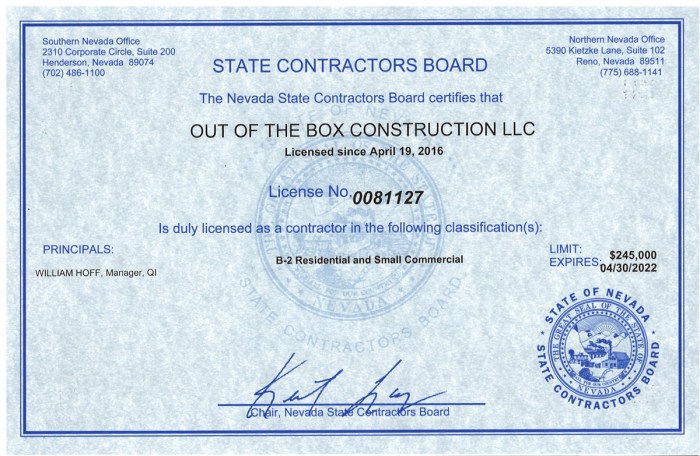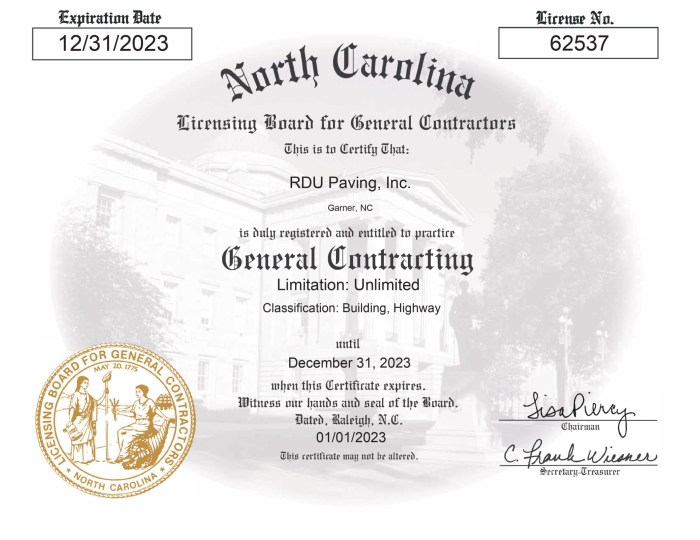The Suffolk County General Contractors License is an essential credential for contractors operating within Suffolk County. It ensures compliance with building codes, enhances professionalism, and unlocks business opportunities. This comprehensive guide provides an overview of the licensing process, requirements, and benefits, empowering contractors to navigate the complexities of obtaining and maintaining this crucial license.
To obtain a Suffolk County General Contractors License, contractors must meet specific eligibility criteria and pass a comprehensive examination. The application process involves submitting detailed documentation and fees, with varying requirements based on the license type sought. Once licensed, contractors are obligated to adhere to building regulations and maintain their license through continuing education and renewal.
Suffolk County General Contractors License Overview

A Suffolk County General Contractors License is a legal requirement for individuals and businesses engaged in general contracting activities within Suffolk County, New York. It ensures that contractors possess the necessary skills, knowledge, and experience to perform construction projects safely and in accordance with building codes and regulations.
There are three main types of Suffolk County General Contractors Licenses: Class A, Class B, and Class C. The class of license required depends on the size and complexity of the projects the contractor intends to undertake.
Application Process
To apply for a Suffolk County General Contractors License, follow these steps:
- Obtain the application form from the Suffolk County Department of Labor, Licensing and Consumer Affairs (DLLCA).
- Complete the application form and provide all required information, including proof of experience and insurance.
- Submit the completed application form, along with the required documents and fees, to the DLLCA.
- The DLLCA will review the application and schedule an examination if necessary.
- After passing the examination, the applicant will be issued a Suffolk County General Contractors License.
The application process typically takes 4-6 weeks to complete.
Examination and Testing
The Suffolk County General Contractors License examination is a written test that covers topics such as building codes, construction practices, and business management.
The examination is administered by the DLLCA and is offered on a regular basis. Candidates are given four hours to complete the exam.
To prepare for the examination, candidates should study the Suffolk County Building Code and other relevant materials.
License Maintenance and Renewal

To maintain an active Suffolk County General Contractors License, the license holder must:
- Renew the license every two years.
- Complete continuing education courses.
- Maintain proof of insurance.
- Comply with all applicable building codes and regulations.
- Complying with all applicable building codes and regulations.
- Ensuring that construction projects are performed safely and in a workmanlike manner.
- Protecting the health and safety of workers and the public.
- Enhanced credibility and professionalism.
- Increased business opportunities.
- Access to public and private construction projects.
- Protection from legal liability.
- Home Improvement Contractor License.
- Electrical Contractor License.
- Plumbing Contractor License.
- Suffolk County Department of Labor, Licensing and Consumer Affairs (DLLCA).
- Suffolk County Builders Institute.
- National Association of Home Builders (NAHB).
Failure to maintain the license can result in suspension or revocation.
Legal Implications and Responsibilities

Holding a Suffolk County General Contractors License carries significant legal implications and responsibilities.
License holders are responsible for:
Failure to comply with these responsibilities can result in civil or criminal penalties.
Benefits of Obtaining a License
There are many benefits to obtaining a Suffolk County General Contractors License, including:
A Suffolk County General Contractors License is essential for any contractor who wants to work in Suffolk County.
Alternative Licensing Options
In addition to the Suffolk County General Contractors License, there are other licensing options available for contractors operating in Suffolk County.
These options include:
The type of license required depends on the specific type of work that the contractor will be performing.
Resources for Contractors
There are a number of resources available to contractors in Suffolk County, including:
These resources can provide contractors with information on licensing requirements, continuing education courses, and other industry-related topics.
Commonly Asked Questions
What are the benefits of obtaining a Suffolk County General Contractors License?
Benefits include enhanced credibility, increased business opportunities, and compliance with legal requirements.
What is the application process for a Suffolk County General Contractors License?
The application process involves submitting documentation, paying fees, and passing an examination.
How long does it take to process a Suffolk County General Contractors License application?
Processing times vary, but typically take several weeks.
What are the requirements for maintaining a Suffolk County General Contractors License?
Requirements include continuing education, insurance coverage, and adherence to building codes.
What are the consequences of failing to maintain a Suffolk County General Contractors License?
Consequences may include fines, suspension, or revocation of the license.